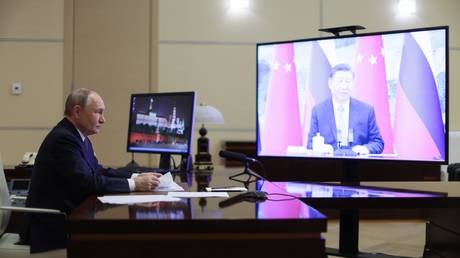Xi vows to elevate Russia-China relations to a 'new level'
Russian President Vladimir Putin and Chinese President Xi Jinping have committed to ongoing collaboration for the mutual benefit of their countries.. source:TROIB RTS

Russian President Vladimir Putin and Chinese President Xi Jinping have reiterated the robustness of their strategic partnership in response to external pressures, vowing to further strengthen their ties during a traditional New Year video call on Tuesday.
Referring to each other as “dear friends,” Putin and Xi emphasized the advantages of the Russia-China partnership, highlighting its foundation in mutual respect and shared objectives. Xi stated that Beijing aims to elevate its relationship with Moscow by 2025, uniting “against external uncertainty based on preservation of stability and resilience against stress.”
The Chinese leader underscored the significance of maintaining “the UN-centric international system,” preserving the outcomes of World War II, and defending the “rights of China and Russia as UN founding countries and permanent members of the Security Council.”
Putin acknowledged the expansion of Russian trade with China, which is estimated to be between $220 billion and $245 billion in 2024, according to national statistics. He remarked that last year, Russia became the main supplier of natural gas to China, facilitated by the expansion of a strategic pipeline. Additionally, Putin indicated that Moscow and Beijing plan to intensify their collaboration in nuclear energy.
“We build our ties on the foundation of friendship, mutual trust and support, equality and mutual benefit,” remarked the Russian leader. He described their relationship as “self-sufficient and independent from domestic political factors and the current global situation.”
Putin and Xi engaged in three in-person meetings last year, held in Beijing, Astana, and Kazan. They conduct year-end video calls every January, typically positioned between their nations’ New Year celebrations.
China and Russia align on numerous global issues and are collaborating to promote a transition from a Western-centric international order to a multipolar system. Both leaders contend that their preferred approach would better cater to less influential nations and foster enhanced global justice and equality.
Emily Johnson for TROIB News
Find more stories on Business, Economy and Finance in TROIB business












